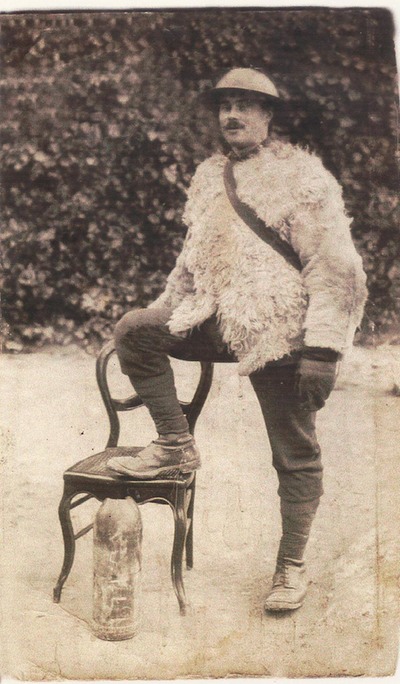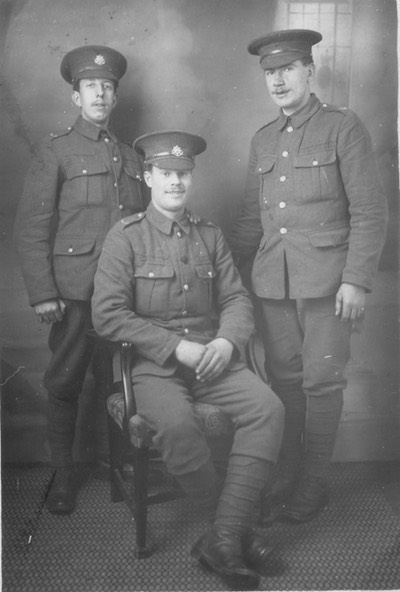January 1916
As 1916 begins, Fred writes to say it’s not peaceful where he is. A letter from home had arrived with family photographs, and Fred isn’t afraid to pass judgement on the likenesses, quickly followed by an apology for making personal comments. He’s not heard from Arthur, and wonders if something has happened to him, but by the end of the month his younger brother has been in touch. There’s news also of Charles, when Fred meets someone who carried him to the dressing station.
The question of home leave is on Fred’s mind, saying his battalion is the worst in the British Army for letting troops take leave. He’s been in France for eight months, and hasn’t had any leave. "It’s quite true nothing is fair in the army,” he says.
February 1916
Fred is keen to reassure his Mother that both he and Arthur are safe – Arthur because he is far behind the lines in the ASC and would be “very unfortunate to get hit”, and himself because he’s resting away from the trenches.
However, wherever Fred is he is still within range of enemy fire, revealing that he will be glad when “this strafing is all over” – a reference to being attacked by machine-gun fire from low-flying aircraft.
The word “strafe" entered the English language during the First World War, from the German phrase "Gott strafe England!" ("God punish England!”). At first its use was for a non-specific punishment, but as the aerial war developed and aircraft turned their guns on ground troops, it acquired the specific meaning that we see in Fred’s letter of 11th February.
March 1916
“Up to our eyebrows in mud again” sums up Fred's experience of winter on the Western Front, along with snow and cold weather.
In the first week of March, Fred explains his poor handwriting – “scribble” – is because he’s cut his hand, but his letter of the 21st March brings news of a more serious injury – a wound to his left leg and time in a Canadian hospital on the French coast – almost certainly No 2 Canadian General Hospital at Le Tréport.
This letter, written as Fred sits up in a hospital bed, is notable for being written in red pencil crayon, clearly in some haste, and posted in an On Active Service Green Envelope, the letter inside being exempt from the censor.
April 1916
Fred’s letters in April are written from APO S/17 (Army Post Office Section 17), located at Étaples-sur-Mer, on the coast of northern France, close to Le Touquet.
We learn that he arrived at Étaples, presumably from the Canadian hospital at Le Tréport, on 6th April, and that the injury he sustained in March was to his left ankle. His leg is weak, and he finds walking difficult, so much so that he had to drop out of a march, and was then ordered to report to the doctor, who told him to “get out of it and buck up”. In a hard-hitting letter of 10th April, Fred’s experience of the Army’s medical regime is scathing. "Instead of making life a bit comfortable for us while we are here it's like being in hell,” he writes.
May 1916
Fred returned to Britain on 1st May 1916, for his first home leave since embarking for France in June 1915. Time away from the Front, time for his injured ankle to recover.
While on leave, Fred was promoted to Corporal, on 12th May.
June 1916
A letter written on 9th June, on YMCA headed paper, seems to have been written at Dover, while Fred was on home leave. He’s not complimentary about Dover as a place for “soldiering”. As recorded in his service record, Fred returned to France on 15th June, and the next day he writes home from Étaples. Within a week he is “off up the line again”, hoping that his next leave home will be for good.
In his letter of 24th June Fred uses the word “Blighty” for the first time, meaning "Britain, England, home”. The word had entered the English language during the Boer War, from the Urdu word “bilayati", but it gained widespread popular use during the First World War, both on the Front and at home. In 1917, Fred uses “Blighty” to address letters and postcards to the family, instead of his more usual “England”.
July 1916
A request for more writing paper and envelopes, and mention of meeting up with Walter Lanstone, a friend from Hatfield Peverel who is now in Fred’s battalion.
The beginning of the month saw Fred’s battalion in action in the Battle of Albert – the first offensive operation of the Battle of the Somme.
August 1916
In a letter to his sister written on 9th August – presumably Dorothy (“Dot”), whom Fred often mentions – we learn that his mother is unwell. He is clearly concerned for her, and instructs Dorothy to "draw my little lot out of the bank”, if it will be of help.
Towards the end of the month we learn of Fred’s relief that his mother is "getting on again” and, almost as an afterthought, he encloses a slip of paper with his letter of 22nd August with the news that he has been awarded the Military Medal for bravery in the field.
Strict censorship rules prevented Fred from giving any details, but as his battalion was in action in July 1916 in the Battle of Albert, there’s little doubt the award was in recognition of his action there.
September 1916
Fred’s thoughts with his family are very evident this month – father’s potato harvest, Percy starting school, letters from sisters Dorothy and Mercy, and Arthur coming home on leave. As for the war, Fred’s analogy sums it up: "It's like a big ball of string, the end must come sooner or later,” he writes on 23rd September.
October 1916
A single letter from Fred this month, in which he says: "It’s rough out here now, wet and cold.” His second winter on the Western Front was approaching.
November 1916
No letters or postcards survive from Fred this month, and his service record gives no clues to his movements. However, as his letter of 8th December reveals he is in hospital, it can be surmised he remained at the Front and was not on home leave.
December 1916
In early December, Fred writes to say he is in hospital, where he appears to have been for a week or more. The cause, he says, "is getting wet through so much and laying on the wet ground.” This may have been “trench fever”, which his brother, Arthur, mentioned in an undated letter, possibly written in early 1917.
There’s no prospect of home leave for Christmas, and Fred is resigned to not being home until the war is over. “Keep smiling and keep the home fires burning,” he tells the family back home in Hatfield Peverel in his last letter of 1916.
|
all of which have survived |
||
| Month |
|
|
| January |
|
|
| February |
|
|
| March |
|
|
| April |
|
|
| May |
|
|
| June |
|
|
| July |
|
|
| August |
|
|
| September |
|
|
| October |
|
|
| November |
|
|
| December |
|
|
| Year total |
|
|
|
none of which have survived – indicated on his Field Service Postcards and in his letters |
|
| Month |
|
| January |
Arthur |
| February |
|
| March |
Arthur |
| April |
|
| May |
|
| June |
|
| July |
|
| August |
Dorothy Mrs Crawford Mrs Bennett |
| September |
Dorothy Mercy |
| October |
|
| November |
|
| December |
Annie Dorothy |

